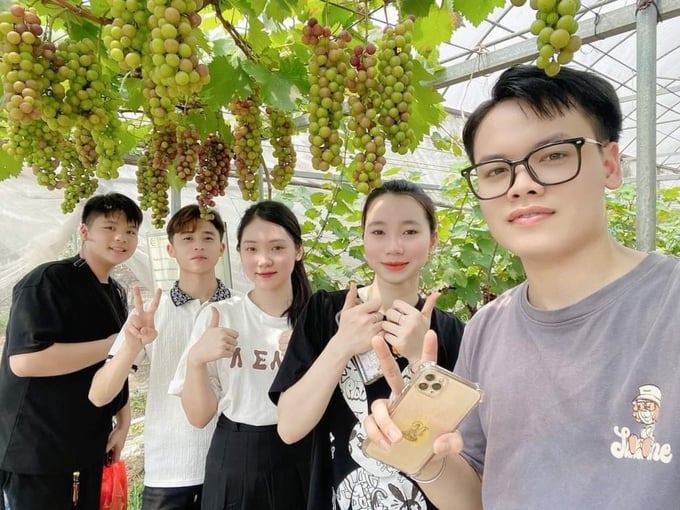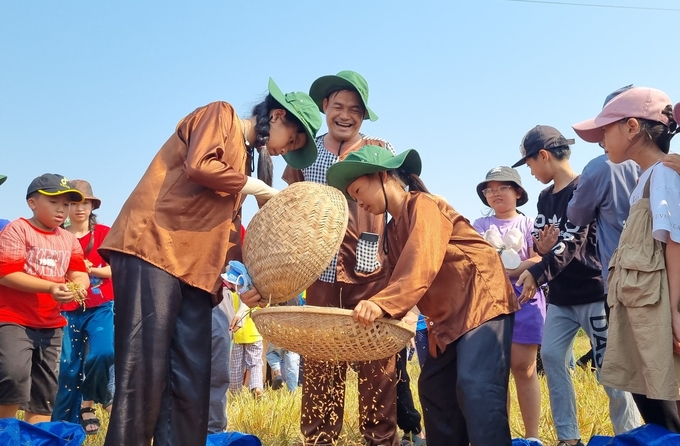June 19, 2025 | 10:56 GMT +7
June 19, 2025 | 10:56 GMT +7
Hotline: 0913.378.918
June 19, 2025 | 10:56 GMT +7
Hotline: 0913.378.918
The purpose of Cooperation Program No. 04 is to improve the collaboration between the Ministry of Agriculture and Rural Development and the Ministry of Culture, Sports and Tourism to maximize the resources and potential of both sectors, thereby fostering the development of sustainable, effective, and inclusive agricultural and rural tourism. At the same time, the program effectively leverages resources associated with agriculture, traditional craft villages, ecological environments, rural landscapes, and the distinctive cultural heritage of various regions to meet market demand.
In addition to clarifying the responsibilities of each ministry and designating specific agencies and mechanisms for collaboration during the implementation process, the program mandates that the initiatives be by the policies, laws, and regulations of the Party, State, and Government.
Consequently, to guarantee its efficacy, the Cooperation Program must be translated into concrete plans and implemented consistently practically, and diversely. The ministries will consistently and actively resolve any issues that arise during the coordination process.
From 2024 to 2030, the program will focus on the advancement of agricultural and rural tourism. The New Rural Development Coordination Office, the Departments of Tourism/Culture, Sports, and Tourism, and the relevant departments and agencies of MARD and MoCST will implement it in provinces and centrally governed cities.
Joint documents will be issued by both ministries to facilitate the execution of duties. They will exchange and distribute information, data, and documents to promote the development of sustainable and effective agricultural and rural tourism. Regular communication will occur through written documents, phone calls, or other methods.
Conferences, workshops, surveys, or joint examinations concerning agricultural and rural tourism development will also be organized by them. On the basis of the functions and responsibilities of each ministry, as well as other forms of collaboration as permitted by law, pilot models and specific solutions related to the development of agricultural and rural tourism will be implemented.
The primary objective is to maintain the successful implementation of Cooperation Program No. 01, which was signed on November 20, 2020, between the two ministries. This program was designed to promote and preserve cultural values, develop rural tourism, and build cultural life under the National Target Program for New Rural Development during 2021-2025.
The goal of the program is to capitalize on the local advantages in agriculture, artisan villages, culture, and ecological environments to promote agricultural and rural tourism. This will enhance the material and spiritual well-being of rural residents by transforming the rural economy toward multi-value integration and sustainability.
In order to address local challenges, integrate rural tourism into the socioeconomic planning of provinces and localities, and provide uniform direction, policies, guidelines, and documents will be developed to promote agricultural and rural tourism. This will guarantee adherence to the overarching economic and social development plans, environmental preservation, and land-use planning, thereby promoting the sustainable development of agricultural and rural tourism and achieving efficient resource utilization.

A group of students from Bac Giang University of Agriculture and Forestry participated in the innovative startup project 'Connecting Agricultural Tourism and Cultural Tourism Destinations' in Bac Giang province. Photo: Pham Hieu.
The program will execute the tasks outlined in a variety of resolutions and initiatives, including the Government's resolution on key tasks and solutions to accelerate the recovery and development of tourism, the Tourism Development Strategy until 2030, the Sustainable Agriculture and Rural Development Strategy for 2021-2030 with a vision to 2050, the Rural Tourism Development Program under the National Target Program for New Rural Development (2021-2025), the Project for Developing the Multi-Functional Value of Forest Ecosystems by 2030 with a vision to 2050, and the Rural Crafts Development Strategy for 2030 with a vision to 2045.
The significance of agricultural and rural tourism in the development of a multi-value, inclusive, and sustainable rural economy will be highlighted through communication initiatives. Diverse media platforms will be implemented to alter perspectives regarding the exploitation of agricultural and rural tourism. Successful agricultural and rural tourism models will be developed and promoted.
The program will assist local administrations in the creation of rural tourism destinations that are both diverse and of high quality. These destinations will exhibit unique agricultural and rural tourism products that leverage the agricultural, ecological, and cultural assets of each region.
The development of a rural tourism product system will prioritize the integration of tourism and agriculture value chains to generate a variety of high-quality experiences that cater to the requirements of both domestic and international visitors. Itineraries and tours will be developed to attract travelers to rural regions.
The program will assist with training and development to enhance the quality of human resources in rural tourism. To enhance the professionalism and efficiency of rural tourism services, training sessions will be conducted on tourism operations and management skills.
The two ministries will collaborate to establish a database on agricultural and rural tourism, which will encompass infrastructure data, visitor spending, and resources. This will serve as the foundation for the management and development of policies that promote the development of sustainable tourism.

Experience rural life through agricultural production activities in Mo Duc District, Quang Ngai.
Routine inspections, surveys, and monitoring will be implemented to guarantee the sustainable and efficient advancement of rural tourism. The ministries will exchange information, data, and materials and offer guidance to localities on the development of agricultural and rural tourism.
MARD will ensure that the program is executed following the duties and responsibilities of its agencies, the Department of Agriculture and Rural Development, and the New Rural Coordination Office. From 2024 to 2030, these agencies will collaborate with localities to establish and execute cooperation programs that effectively and sustainably advance agricultural and rural tourism.
The Central New Rural Coordination Office and the National Tourism Administration of Vietnam will conduct a joint evaluation of the program's implementation, report to the ministries, and conduct a preliminary review on an annual basis.
The functions and responsibilities of each ministry will determine the allocation of funding for these collaborative activities. Additionally, the successful implementation of the cooperation program will be ensured by prioritizing resources from the Rural Tourism Development Program under the National Target Program for New Rural Development and other related initiatives.
Translated by Linh Linh

(VAN) To address plastic pollution, closing the plastic recycling cycle will bring significant economic and environmental benefits.

(VAN) According to the Binh Thuan Department of Industry and Trade, in the first five months of 2025, Binh Thuan's dragon fruit export turnover increased by 20.65% compared to the same period last year.

(VAN) EU countries on Thursday gave final approval to new tariffs on fertilizer imports from Russia, a move aimed at cutting off revenue that could support Moscow’s war in Ukraine, despite concerns from European farmers.

(VAN) The working delegation from the Ministry of Agriculture and Environment conducted an important trip to the Netherlands to strengthen strategic partnerships and sustainable development in the agricultural sector.

(VAN) The letter ‘A Plea from the Ocean’ not only evokes emotion but also awakens the human conscience to the responsibility of protecting life on Earth.

(VAN) The Department of Agriculture in South Africa has announced the country’s first mass vaccination of poultry to prevent local birds from contracting avian influenza.

(VAN) Establishment of the Mekong Delta Regional Agricultural Linkage Center, aiming for a closed value chain, deep processing, trading platforms, and international market connectivity.